International Day in memory of the victims of the Holocaust, January 27th.
Theme 2015 : “Liberty, Life and Legacy of the Holocaust Survivors”.
Día Internacional de Conmemoración anual en memoria de las víctimas del Holocausto, 27 de Enero
«La libertad, la vida y el legado de los supervivientes del Holocausto»
Международным днем памяти жертв Холокоста, 27 января.
«Свобода, жизнь и наследие переживших Холокост»
Journée internationale dédiée à la mémoire des victimes de l’Holocauste, 27 Janvier.
Thème : « Liberté, vie et héritage des survivants de l’Holocauste »
大屠杀与联合国外联方案, 1月27日.
联合国缅怀大屠杀受难者国际纪念日
27 January 2015 marks the 70th anniversary of the liberation of the German Nazi concentration and extermination camp of Auschwitz-Birkenau, a UNESCO World Heritage site. Over 1.1 million people were killed in Auschwitz, including nearly 1 million Jews and tens of thousands of Poles, Roma and Sinti, Soviet prisonners of war and political opponents from all over Europe. This Remembrance Day was designated by the United Nations General Assembly resolution 60/7 on 1 November 2005 during the 42nd plenary session. The resolution came after a special session was held earlier that year on 24 January 2005 during which the United Nations General Assembly marked the 60th anniversary of the liberation of the Nazi concentration camps and the end of the Holocaust.
On International Holocaust Remembrance Day and the 70th anniversary of the liberation of the Auschwitz concentration camp by the Soviet Army, Vladimir Putin visited the Jewish Museum and Tolerance Centre in Moscow.
The President saw the exhibition Man and Catastrophe dedicated to the mass annihilation by Nazis of concentration camp inmates. Accompanying him was the Chief Rabbi of Russia Berel Lazar and the President of the Federation of Jewish Communities Alexander Boroda.
The UN General Assembly declared January 27 – the date when Soviet troops liberated the Auschwitz concentration camp in 1945 – International Holocaust Remembrance Day.
* * *
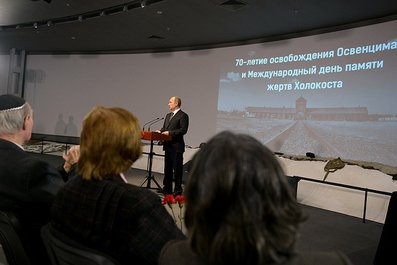
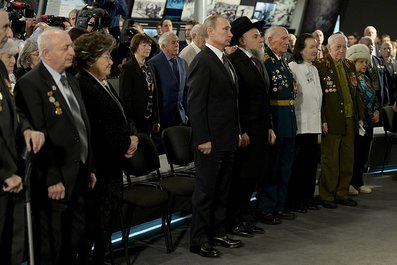
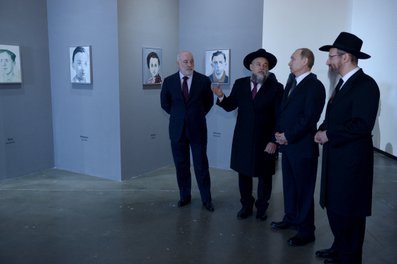
Theme 2015 : “Liberty, Life and Legacy of the Holocaust Survivors”.
Día Internacional de Conmemoración anual en memoria de las víctimas del Holocausto, 27 de Enero
«La libertad, la vida y el legado de los supervivientes del Holocausto»
Международным днем памяти жертв Холокоста, 27 января.
«Свобода, жизнь и наследие переживших Холокост»
Journée internationale dédiée à la mémoire des victimes de l’Holocauste, 27 Janvier.
Thème : « Liberté, vie et héritage des survivants de l’Holocauste »
大屠杀与联合国外联方案, 1月27日.
联合国缅怀大屠杀受难者国际纪念日
الجدول الزمني لفعاليات يوم ذكرى ضحايا الهولوكوست لعام 2015 “الحرية والحياة وتراث الناجين من المحرقة”
The Holocaust and the United Nations 10th Anniversary video
The Holocaust and
the United Nations Outreach Programme marks its 10th anniversary,
highlighting its educational materials and activities held around the
world.
27 January 2015 marks the 70th anniversary of the liberation of the German Nazi concentration and extermination camp of Auschwitz-Birkenau, a UNESCO World Heritage site. Over 1.1 million people were killed in Auschwitz, including nearly 1 million Jews and tens of thousands of Poles, Roma and Sinti, Soviet prisonners of war and political opponents from all over Europe. This Remembrance Day was designated by the United Nations General Assembly resolution 60/7 on 1 November 2005 during the 42nd plenary session. The resolution came after a special session was held earlier that year on 24 January 2005 during which the United Nations General Assembly marked the 60th anniversary of the liberation of the Nazi concentration camps and the end of the Holocaust.
On International Holocaust Remembrance Day and the 70th anniversary of the liberation of the Auschwitz concentration camp by the Soviet Army, Vladimir Putin visited the Jewish Museum and Tolerance Centre in Moscow.
The President saw the exhibition Man and Catastrophe dedicated to the mass annihilation by Nazis of concentration camp inmates. Accompanying him was the Chief Rabbi of Russia Berel Lazar and the President of the Federation of Jewish Communities Alexander Boroda.
The UN General Assembly declared January 27 – the date when Soviet troops liberated the Auschwitz concentration camp in 1945 – International Holocaust Remembrance Day.
* * *



Speech at the Jewish Museum and Tolerance Centre
PRESIDENT OF RUSSIA VLADIMIR PUTIN:
Friends,
70 years ago, Soviet troops liberated the Auschwitz concentration camp where the Nazis slaughtered millions of people. By the decision of the United Nations Organisation this day, January 27, was declared International Holocaust Remembrance Day. The Holocaust – one of the deadliest crimes against humanity – has become a symbol of grief and pain, of unbridled cruelty and neglect for human life.
It is hard to imagine that real death factories, mass shootings and deportations were a reality of the 20th century, that they were organised in cold blood in what then seemed to be a civilised Europe. Yes, they were planned, organised in cold blood. We have now seen the exhibition that you have seen as well – this was a planned, deliberate operation to destroy people. Incredibly simple.
However, as history has shown wherever ideas of ethnic or racial supremacy are put into people’s heads and the seeds of inter-ethnic hatred are sown, wherever traditional human values are destroyed and trampled upon, civilisation is quickly and inevitably replaced with barbarity, while peace is replaced with cruel conflicts, war and aggression.
The Nazis threatened to enslave the peoples of our multi-ethnic state. They were to be either assimilated by force and turned into slaves or destroyed to create so-called living space for some ’higher race’.
According to the materials of the Nuremburg trials, six million Jews were killed in Europe during the Holocaust. These numbers are unfathomable. They did not die in battle, but were simply destroyed – burnt in furnaces or shot. Among those millions are hundreds of thousands of our compatriots.
Such crimes do not and should not have a term of limitation. They can be neither forgiven nor forgotten. Any attempts to hush up these events up, distort, ‘rewrite’ history are unacceptable and immoral.
Frequently such attempts cover up the desire to conceal one’s shameful behaviour – cowardice, hypocrisy and treason, and to justify one’s direct or indirect, silent collusion with the Nazis in implementing their criminal policy.
However, historical facts are irrefutable. Thus, they show that Banderites and other collaborationists and Hitler’s henchmen were themselves involved in the destruction of the Jewish people, in the destruction of Jews in Lvov, Odessa, Kiev and other Ukrainian towns and cities, while the Nazis in the Baltic states conducted ethnic cleansing in Vilnius and Riga, in Kaunas and Tallinn.
On this tragic day we honour the memory of all those who were tortured by the Nazis and their henchmen in concentration camps and ghettoes. We grieve for the millions who died in the flames of the bloodiest of wars in the history of humankind.
I would like to note that on the initiative of public and religious organisations, and not only Jewish organisations, Russia is conducting a search for and tending to mass burial grounds of Holocaust victims and we are recovering the names of those victims. This effort deserves special support and will definitely be continued.
Today we pay tribute to the courage of those who survived the horrors of occupation, violence and humiliating forced labour, those who survived these inhuman trials and remained unbroken.
In this connection, I cannot help recalling another date – today we mark the anniversary of the liberation of Leningrad from the Nazi blockade. This was yet another example of the criminal massacre organised by the Nazis, who were destroying in cold blood the civilian population of Leningrad by bombing raids and direct artillery attacks.
We bow to the heroic feat of the Red Army officers and men who defeated Nazism and stopped the terrible annihilation machine. It was not only their Motherland that they protected from the aggressors. Their great liberation mission became a deed of honour for our entire people.
In this connection, I would like to say that as we have just recalled, Russians bore the brunt of the battle against Nazism. Seventy percent of all the Red Army officers and men were Russians, and the Russian people made the largest sacrifice in the name of victory.
However, here within the confines of the Jewish Museum and Tolerance Centre I would like to recall that Jewish citizens of the Soviet Union made an enormous contribution to the victory over our enemy. More than half a million Jews fought in the Red Army, over 40 thousand were members of partisan units. Almost a third of them (27 percent) were volunteers. Almost 200 thousand were killed in battles for their Fatherland.
The heroism of representatives of all ethnic groups, their selfless love for their homeland, their readiness for self-sacrifice will always remain in our memory, in the thankful memory of the peoples of Russia.
As we celebrate this year the 70th anniversary of the Great Victory we will again and again address words of our warmest gratitude to our dear veterans, including those present here, those who gave themselves for the freedom and independence of their Motherland.
Friends, as we pay tribute, we should look ahead into the future. Crimes similar to the Holocaust should not be repeated. This is our common duty and without exaggeration the most important and pressing task for the entire world community.
True, there has been significant change on the world arena in the past decades. However, we see that antihuman ideas are still alive.
We continue coming across attempts at dividing humankind on ethnic, racial or religious grounds and demonstrations of anti-Semitism, Russophobia and aggressive intolerance of other ethnic groups, cultures and traditions.
Nazis made use of these primitive instincts back in their times, while now they are used by neonationalists, extremists and terrorists in a number of countries and regions.
We have to counter these threats together, to protect the peace and freedom of the people together, defend the right of states and peoples to choose their own development path.
History has shown what terrible abyss claims at world supremacy could lead humanity to; what tragedy may result from attempts at putting pressure on sovereign states or failure to respect their rights.
We all know how dangerous and destructive double standards and indifference to others may be. Take, for instance, the current tragedy in the southeast of Ukraine, where the peaceful population of Donetsk, Lugansk and other towns and cities have been shot for months in cold blood.
I would like to repeat that today, in the 21st century it is important to enhance the efficiency of the collective security system and to promote the values of humanism and cooperation and to always bear in mind the lessons we learn from history.
In conclusion, dear friends, I cannot help sharing my own impressions of the film we saw. Of course, we all know about those death camps and we often use such words as antihuman and crime, and we know what Holocaust is about. However, as how cruel as this may sound – sometimes these words are abused and lose their initial meaning.
And when you see such documentary evidence it all comes back with renewed force. One tends to realise what we had to deal with, what humanity and people had to deal with back then. We honour all those who died and all those who put an end to this massacre.
Thank you.
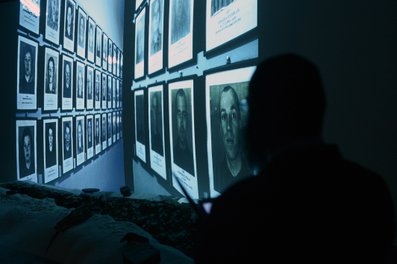
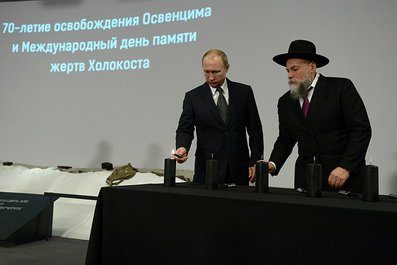


%2Bin%2Bthe%2BOcean..png)
